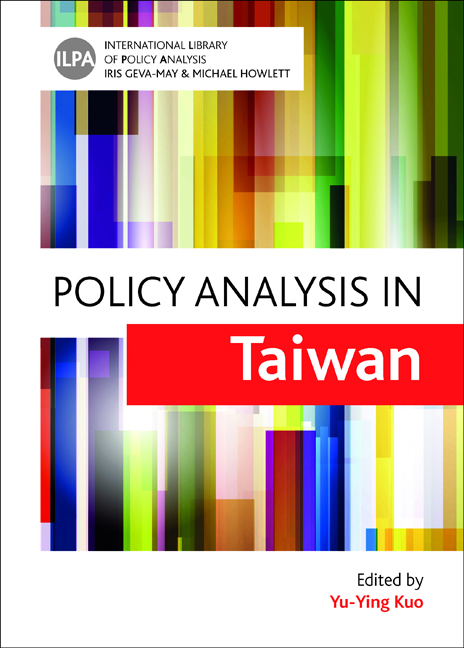Book contents
- Frontmatter
- Contents
- List of tables and figures
- Acknowledgements
- Notes on contributors
- One Policy analysis in a time of turbulence
- Two Exploring policy advisory committees in the central government
- Three Analysis of innovative local government policies in Taiwan
- Four Policy analysis in the legislative body: the legislative process of the Soil and Groundwater Pollution Remediation Act in Taiwan
- Five Policy analysis in the local councils
- Six Gendering policy analysis? The problems and pitfalls of participatory ‘gender impact assessment’
- Seven The power of influencing policies, or getting their share and more: interest groups in Taiwan
- Eight Think tanks in Taiwan
- Nine The development of public engagement in Taiwan
- Ten Social media and policy evolution in Taiwan
- Eleven Policy analysis by non-governmental organisations in Taiwan
- Twelve Policy network of universal healthcare reform in Taiwan
- Thirteen Public policy and administration research
- Fourteen Too critical to ignore? A tri-dimensional relationship examination of policy analysis internship in Taiwan
- Fifteen Policy analysis in Taiwan in an international perspective
- Sixteen Policy analysis education in Taiwan: a comparative perspective
- Index
Two - Exploring policy advisory committees in the central government
Published online by Cambridge University Press: 11 March 2022
- Frontmatter
- Contents
- List of tables and figures
- Acknowledgements
- Notes on contributors
- One Policy analysis in a time of turbulence
- Two Exploring policy advisory committees in the central government
- Three Analysis of innovative local government policies in Taiwan
- Four Policy analysis in the legislative body: the legislative process of the Soil and Groundwater Pollution Remediation Act in Taiwan
- Five Policy analysis in the local councils
- Six Gendering policy analysis? The problems and pitfalls of participatory ‘gender impact assessment’
- Seven The power of influencing policies, or getting their share and more: interest groups in Taiwan
- Eight Think tanks in Taiwan
- Nine The development of public engagement in Taiwan
- Ten Social media and policy evolution in Taiwan
- Eleven Policy analysis by non-governmental organisations in Taiwan
- Twelve Policy network of universal healthcare reform in Taiwan
- Thirteen Public policy and administration research
- Fourteen Too critical to ignore? A tri-dimensional relationship examination of policy analysis internship in Taiwan
- Fifteen Policy analysis in Taiwan in an international perspective
- Sixteen Policy analysis education in Taiwan: a comparative perspective
- Index
Summary
Introduction
As many policy scientists have indicated, contemporary policy problems are complicated because they are ill-structured in nature (Mitroff and Emshof, 1979; Radford, 1977). Policy makers often find themselves in a position where they must address policy issues that involve multiple stakeholders, who have various conflicts of interest, or policy problems that involve unknown or intertwined causal relationships. In such situations, policy makers must still make policy decisions, even though they lack complete information and the policy environment is awash with uncertainty. To help them navigate the decision-making process, policy makers often seek assistance from policy experts who possess the necessary knowledge and information.
Policy making is the purposeful allocation of public resources by government. Public policies not only include the programmes and actions that are carried out by the government, but also those activities that the government decides to not carry out. These decisions influence who can receive resources from the government. While policy making is the exercise of governmental power, policy analysis and the issuance of policy advice is also the exercise of power to influence the policy-making processes used by the government (Wilson, 2006). Policy analysis activities provide the basis for policy making and lead to patterns of effective and desirable resource allocation. The institutional design of a policy advisory system influences the stakeholders, as well as the information and knowledge, present in the policy process.
Since the 1980s, the government of Taiwan has faced the challenge of an increasingly complex policy-making environment due to the significant transition and development of social, political and economic factors. Taiwan's political system has transformed from an authoritarian dominant-party system to a democracy. The country's industrial activities have also grown and tightly connected to the global economic system. These political and economic developments inspired the citizens and interest groups demand open access to and participation in the public policymaking process. These developments have increased the complexity and diversity of policy issues under consideration, and the demands for responsive policies that meet the public's needs.
Policy advisors help policy makers to bridge policy-making activities and professional knowledge and to solve the policy problems government agencies face.
- Type
- Chapter
- Information
- Policy Analysis in Taiwan , pp. 23 - 38Publisher: Bristol University PressPrint publication year: 2015

